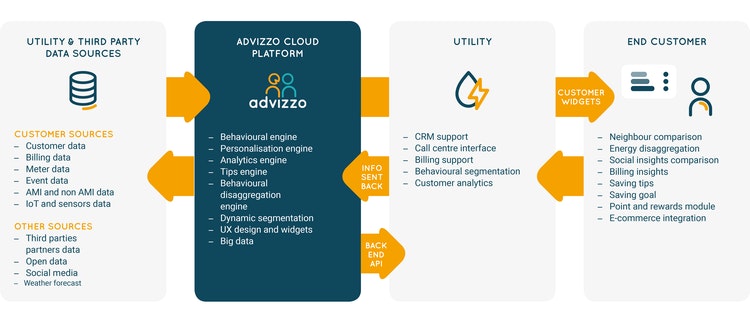Case Study: Behavioural Insights-Driven Customer Engagement
Advizzo
Context
One of the main channels through which digital technologies can translate into energy efficiency is by encouraging consumer engagement and behavioural changes. However, utilities have been lagging behind when it comes to customer engagement compared to other sectors such as banking and retail.
Digitalisation and government intervention are beginning to change utilities’ relationships with customers. The online experiences customers are accustomed to in areas such as retail are raising the standards of utilities’ operations in metering, billing, and payment. In addition, developments in power storage and self-generation are eating away at utilities’ revenues. To continue to grow, utilities are increasingly adopting new service-based business models, akin to a partnership with customers, shifting from being simply suppliers of a commodity.1 At the same time, utility regulators such as Ofwat, the UK water regulator, are urging the sector to improve customer experience and drive efficiency with the effective use of customer data. Both the technology and policy change are pushing utilities to accept improved customer engagement using digital technologies.
Simply relying on technologies on their own to deliver behaviour change is not enough and as technology has advanced, customer expectations have evolved too. For example, smart meter rollouts in several jurisdictions have demonstrated that engaging customers with tailored solutions is crucial. For example, a recent study shows that while smart meters and in-home displays are the catalyst for creating consumer interest in ways to use, monitor, and save energy, behaviour change needs something beyond access to information: Many people want more specific, tailored information to support them in making further behavioural changes.2
Description
Advizzo combines digital technologies and behavioural science, and provides cloud-based customer engagement solution software for energy and water efficiency. The company integrates utility data such as CRM, billing, and AMI meter data, both historical and real time, with relevant third party data such as weather and social media data in a single framework. They use data science techniques to extract personalised insights and identify the behavioural patterns of each customer. They then use behavioural science to engage with households to motivate behavioural change and improve satisfaction.
The technology offers applications for consumers and utilities, as follows:
For consumers:
- Home reports to help consumers to track their usage and reduce waste
- Personalised interventions and messages tailored to their motivators
- Points and rewards to help consumers to achieve their efficiency goals
- Feedback regarding consumers’ own consumption compared to the levels of similar homes in their areas to help them to create a reference points
For utilities:
- Customer analytics of past, current, and future usage.
- Customer segmentation based on their behavioural patterns
- CRM and billing support, call centre interface, etc.
Advizzo cloud platform's position in the energy market

Impacts
Customers are offered services such as high usage / leak detection, home usage reports, and personalised feedback, all of which help them to better understand usage patterns, and save water and energy consumption. The use of utility data to “nudge” customers enables, on average, a 3% reduction of their consumption. For example, the My Sustainability Living Program at DEWA, Dubai has achieved between 2% and 3% reduction in electricity and water consumption by changing people’s habits.
Opportunities and barriers
Government policy and regulation play critical role in driving demand for services like those provided by Advizzo. For example, in the UK, Ofwat’s 2017 Price Review Criteria for the period starting in 2019 included a goal of urging water utilities to make better use of their customer data and improve customer experience.3 The regulator now imposes penalties worth 80 million pounds, which have encouraged utilities to engage with consumers. In Dubai, the UN Sustainable Development Goals provided a driver for utilities to create the first ever behavioural engagement program for a utility in the Gulf Cooperation Council.
References
PwC global power & utilities (2016), Customer engagement in an era of energy transformation
Futurethinking (2019), The effectiveness & consumer experience of In-Home Displays
Ofwat (2017), Unlocking the value in customer data: a report for water companies in England and Wales
PwC global power & utilities (2016), Customer engagement in an era of energy transformation
Futurethinking (2019), The effectiveness & consumer experience of In-Home Displays